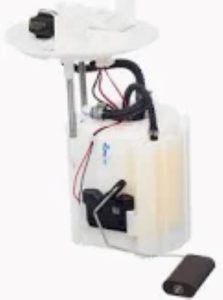When a fuel pump is clogged up, your engine has reduced power, which you will see the first when it comes to fuel efficiency. As the pump gets clogged it finds it hard to supply the necessary fuel flow, hence dropping the fuel pressure below the normal 40-60 PSI. This inefficiency can boost fuel consumption by as much as 10%, and requires the engine to work that much harder to maintain performance. Miles per gallon (MPG) falls likewise when drivers are under heavy acceleration or driving at high speeds.
Another of the most common symptoms is not being able to start the engine. A fuel pump that is clogged or internally restricted will not have the ability to deliver fuel to the engine which can result in a long crank time or the vehicle failing to start. For instance, a pump that normally flows 150 liters per hour (LPH) might only flow 100 LPH when clogged and cause starvation of fuel. In more extreme cases, the engine may crank several times before starting, or it may idle for only a moment then shut off due to not enough fuel feed.
Another result of a clogged fuel pump is engine misfires or sputtering. Pump, when fails to provide stable fuel pressure may cause engine misfire under load and acceleration. The fact that it feels a lot slower getting up hills or pulling heavy weights doesn't help, either. Under these conditions the fuel pump has a hard time maintaining enough fuel pressure to keep everything running as it should, which will cause engines to lose power for just a blink of an eye. A drop in fuel pressure over 20% will cause the engine to have misfires, a rough idle or stall without warning.

An abrupt loss of power during acceleration signals another filter-clogged fuel pump. This causes the engine to feel like it's missing on acceleration, or otherwise not accelerating properly. The manufacturer estimates, for instance, that a sluggish pump — one that limits the flow of fuel through even just 15% could prevent the car from reaching highway speed during a merge scenario, ultimately creating a dangerous situation. This can sometimes be further exemplified with a whining sound that you would hear coming from the fuel pump, indicating the pump is straining to supply enough fuel to your engine.
When a fuel pump becomes clogged as well, it will tend to overheat. A pump that is fighting to send fuel through an obstruction will produce unnecessary heat; this can reduce the life span of a pump. Fuel pumps are usually rated to last between 100,000 to 150,000 miles or more, although excessive heat damage caused by clogs can reduce this lifespan up to 30%. Before you know it, a blocked fuel pump could be the cause of your entire fuel system malfunctioning, necessitating repairs that can run from $300 to over $1,000 depending on your vehicle and just how much damage has been done.
READ MORE AND DISCUSS HERE…Fuel Pump Diagnosis And Repair…Infoureau_Execute();.onDestroy(function() {googletag.cmd.push( function() { googletag.destroySlots(); })});